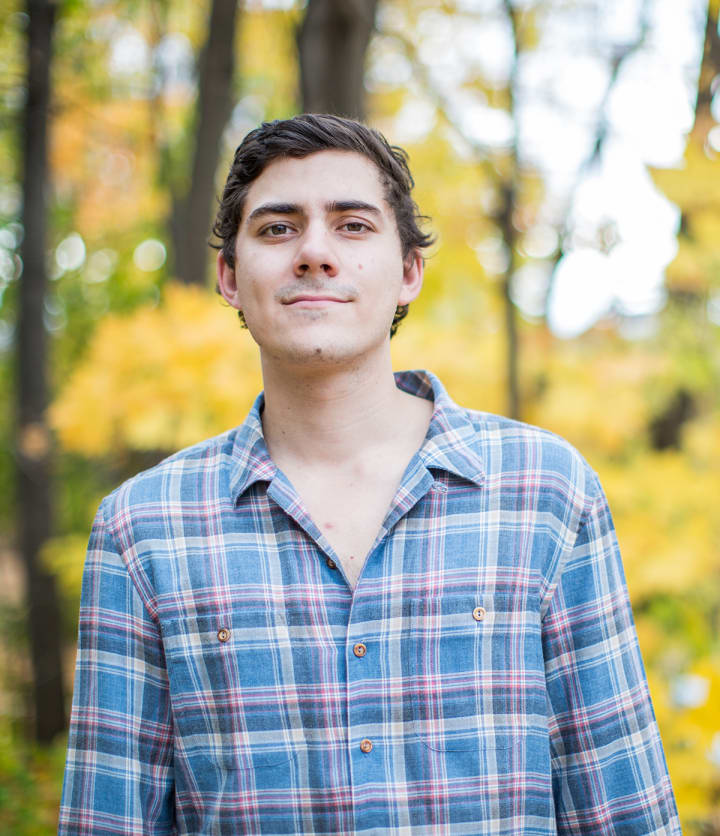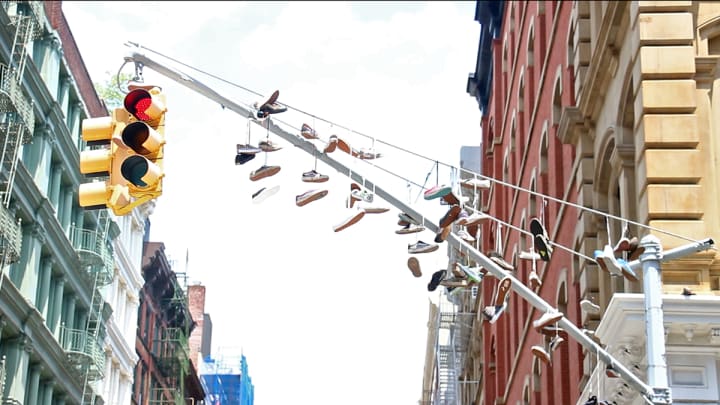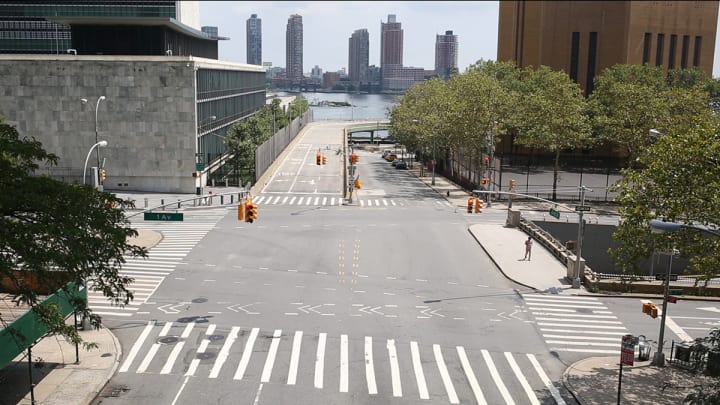Living in a Disconnected World
David Karp's film 'Disconnected' envisions a technology obsessed society where human beings plug in and tune out, missing life's natural occurrences.
David Karp, a recent graduate from Cornell University, is part of the up-and-coming trend of initiative Millennials taking their careers by storm. In his visionary film Disconnected, Karp sees the world through a lens that we all find ourselves bound to: that of the screen. In a world where screen-time replaces human interaction, what does it mean to truly be alive?
David Karp's art is defined by his unique approach to storytelling, whether it be through film, photography, or writing. Disconnected portrays a world that encompasses small facets of our own, as each of Karp's films represent one portion of humanity. Young, driven, and full of creativity, David Karp is OMNI's next filmmaker to follow.

Photo courtesy of David Karp
OMNI: What is your film Disconnected in ten words?
David Karp: A visual and metaphoric representation of society’s obsession with technology.
Disconnected began in an unconventional way for me. I didn't know I was going to make a film commenting on society’s unhealthy dependency on technology. I made Disconnected the summer I got my first video camera and was focused on learning how to use the camera and imitate certain styles/edits that I had seen online or in films. Around the time I got my camera, I saw a video a French couple made where they somehow edited all the cars and people out of the streets of Paris. I was blown away and decided I would figure out how they did it and make a video with empty Manhattan streets. After a few weeks and lots of googling, I figured it out and decided that I should apply this style to a narrative form. I thought about what kind of story I could tell and quickly decided that the empty streets could prove to be a powerful visual metaphor for what is lost when an individual is too absorbed in their phone and other devices.
Do young filmmakers face the same difficulties in entering the entertainment industry today as they did 30 years ago? What has changed and what has remained the same in that respect?
Cracking into the entertainment industry will never be easy, but at least now it feels as if there are infinitely more avenues through which one can ascend. Also, access to high level film equipment has never been more democratized. For the first time, the ability to make videos is in the hands of everyone thanks to smart phones capable of filming in 4K, GoPros, and semi professional video cameras that can be acquired for less than $1,000. My film beginnings speak to this point. I got a GoPro towards the beginning of the craze—this taught me two crucial aspects of filmmaking: gathering footage and editing/sorting that footage. When I eventually got my first real camera, I turned to YouTube and Google searches to learn how to use the device.
Already in the last decade we have seen so many successful careers begin via YouTube videos, web series, or low-budget productions. Donald Glover’s prodigious career as a writer, actor, and musician began on YouTube with Derrick Comedy—responsible for countless viral videos. More recently, two members of the online comedy group Good Neighbor are now stars on SNL only a few years later. Successful TV shows like Broad City were discovered online in web series forms. Even juggernauts in the industry like HBO are acquiring original content off the internet—they recently purchased a very successful web series “High Maintenance” to develop it into a TV series.
Overall, the biggest change is that way more individuals are creating content—and the number of companies interested in original content has also skyrocketed. Non-traditional entertainment companies like Facebook and Verizon are in the midst of launching original content divisions like Amazon has already successfully done.
Tell us, what was The Film that lead you to the art of storytelling?
Woody Allen’s Annie Hall. Woody Allen’s narratives focus on rather quotidian topics usually grounded in love and relationships, yet the way Allen tells these narratives grips the viewer as if they were watching something they had never encountered before. I always knew that film could transport you to foreign, surreal worlds, but it was Allen’s ability to transform the everyday into something magical that truly lead to my obsession with storytelling.

Photo courtesy of David Karp
I have to say, my favorite part about watching Disconnected was seeing the streets of New York City devoid of people and cars. How did you make that happen?
Definitely the most time consuming editing process I have ever gone through (laughs). I would film each empty street shot on a tripod (so the frame was static) for around five to eight minutes. The point of waiting five to eight minutes was so that over the course of the video every bit of sidewalk and street at one point of time would be bare without cars or people. I would take this five to eight minute clip and export it into Photoshop as thousands of individual photographs. Once I had the photos, I would search for the different moments in photos where portions of the sidewalks and streets were uncovered. Next I would layer as many photos as needed to create one photo where there was nobody on the street. This would normally require around 80 photos. I would take this photo and bring it into Premiere Pro (my editing software) and add cropped portions of video layer from the original video to animate the photo so it looked like a video. I would add video layers of street signs, trees, clouds, birds, and, of course, my protagonist and best friend who appears in the video walking through the streets looking down at his cell phone.
What are the benefits and drawbacks of being “connected” and “disconnected”? How––in this generation––are we “connected through technology yet disconnected socially?”
Our current generation has access to more information (important and trivial) than any other generation in the history of mankind. Having access to information has its obvious benefits, but the digitization of our culture has led to some very negative consequences. There is an absolute obsession with personal projection. Via apps like Snapchat, Instagram, and Facebook, people are given the power to project to the public whatever aspects of their life that they want to share. This creates a prevalent, yet warped visibility of the private life. This has many consequences. One, it’s led to an entire generation who is more preoccupied with how they can use social media to construct the appearance of a vibrant life rather than going out and living one. Two, it creates a competitive and detrimental system of self-measurement. Because everyone is always projecting the best moments of their life (and not the low moments), individuals who see this inevitably compare what they see online from their peers to their own life.
What scares me about this the most is that these technologies and apps are in the hands of children as young as twelve. Imagine a twelve-year-old, who gets home from school and checks Snapchat, Facebook, and Instagram only to see five of his peers hanging out and having fun while he was uninvited. The system of self projection and in turn measurement/evaluation is extremely dangerous, especially to younger children.
As I’m sure you’ve experienced in film, the final product often varies from your ideas on the drawing board. How do you know when your story is complete? And is it ever perfect?
Not to sound cliche, but a film can probably never be perfect. There are too many variables. One will always set out to make a specific film, but inevitably realize they have created something different. A film is created three times: once when you write the script, once when you film it, and once when you edit it.
What do you believe to be the biggest transition from moving from a college-filmmaker to and independent one, or even an industry filmmaker in the future?
As a college filmmaker, people are impressed by the simple fact that you’ve picked up a camera and executed an idea to completion—if the quality of the final product is good, that’s just an added bonus. For college filmmakers, people are very forgiving of little things that aren't so little at a professional level: acting, continuity, weak narratives, and low production quality. With my videos so far I have proved that I am obsessed with the craft and that I’m very serious and diligent about my work—hopefully I’ve exhibited a potential for my future works. Now that I’ve graduated, the thing I’m most focused on is taking my writing and production to a higher, more professional level. Aware that I will not have a big budget for my next project, I am focusing on crafting a sophisticated narrative that is very executable production-wise. I think it’s most important to demonstrate a firm grasp on all aspects of the process and I believe this can be done in a project as short as five minutes long.
Why do you tend to gravitate towards science fiction as a genre? How would you define the term "science fiction"?
I view science fiction as a twin brother to the horror genre. Whereas the horror genre projects society’s current fears, science fiction is a projection of society’s anxieties about the future based on things that are beginning to change in the present. I gravitate towards science fiction because it looks ahead into an unknown. The job of the science fiction author is to create an entire future/alternate world whose foundation resides in the present. I think part of the power of science fiction is its inherent bond to societal commentary.

Photo courtesy of David Karp
How is humanity reflected in film?
Every film represents a slice of humanity––one individual's perception of the world. Film is the exploration of something that exists or could exist.
What advancement (plausible or implausible) would you like to see in the film industry?
One advancement that we are very near is the advent of virtual reality. Once this becomes accessible we will start to see films where the viewer, fully immersed in the diegetic world of the film, is allowed to look wherever he/she would like. This will open many filmmaking possibilities, but also deviate from one of film’s core values; one of the central powers of film resides in the director’s ability to control your eyes. The director, cinematographer, and editor have 100 percent control of what the viewers sees and how they see it (close up or wide angle? long take or rapid montage editing?). Once VR technology enters the arena, the director will relinquish some of this power in manipulating perspective. However, this will also open up new doors. Imagine a scene from a horror film where the characters are in the woods at night (a popular motif of the genre)—with VR, the viewer can be placed in the woods with the ability to look around 360 degrees, completely in the dark as to what might happen next alongside the characters in the film. VR will undoubtedly yield incredibly immersive, creative and groundbreaking films.
At this point in your life, could you even imagine doing anything else besides being a filmmaker?
No! The ultimate goal is to go into narrative filmmaking, but I would be very content doing anything involving a camera. I would happily make Jeep commercials my whole life. I am currently in Peru for five weeks making videos and taking photos for a hotel and tourism company based all around Peru. Though this is very far from my narrative goals, it all leads to the same place. Every time you pick up a camera you develop your sense of cinematography and how to best visually capture a moment. Additionally, a filmmaker once told me that he learned more about film by spending time in a country where he didn't speak the language because it forced him to analyze body language, forgetting about dialogue or spoken word.
What is the best piece of advice you’ve ever been giving? How does it factor into your life today?
Never stop creating. Whether that means taking pictures, writing, or filming. I believe the key to succeeding in this industry is to always have a part of your mind dedicated to turning the things around you into a story worth telling.
About the Creator
Natasha Sydor
brand strategy @ prime video






Comments
There are no comments for this story
Be the first to respond and start the conversation.